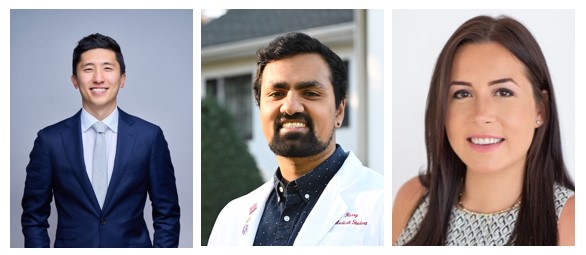Medical Students to Present Research at AAMC Conference
SOM Students Cited Lack of Time and Knowledge of Opportunities and Difficulties Finding a Mentor as Limitations to Conducting Research

School of Medicine (SOM) students Harry Haran, SOM Class of 2025, Nicole Liddy, M.S., SOM Class of 2024, and Joshua Choe, M.S., SOM Class of 2024, have been selected to present their study on medical student research at the AAMC Annual Meeting this November in Seattle.
“Currently, medical students interested in completing research face many barriers, including access to research mentors, time restrictions and financial. This is further underscored by the recent changes in the USMLE Step 1 exam to pass/fail scoring system, which may lead residency programs to be more inclined to assess applicants holistically,” said Haran.
“With students who planned to apply to competitive residency programs expressing interest in having more time to study for the USMLE Step 2 exam and to conduct research, we were interested in any trends in student research productivity,” said Liddy. “So we decided to survey the SOM students to gain a better understanding of the students' perspectives on conducting research, evaluate potential and active barriers for students interested or engaged in research and provide potential and realistic solutions to help optimize their research experience here at NYMC. “
With support from Mary Petzke, Ph.D., assistant dean for medical student research and associate professor of pathology, microbiology and immunology, and Jerry Nadler, M.D., former SOM dean, the students conducted an online survey with 577 respondents. “The major limitations that students described included a lack of time to complete research followed by a lack of knowledge of opportunities and difficulties finding a mentor,” said Choe. “Although a primary goal for optimizing a medical student’s research experience is to develop a more competitive residency applicant, medical schools should equally be focused on instilling a mindset that highlights the necessity for research and evidence-based medicine in a constantly evolving profession. With greater participation, comes increased diversity, which in turn will lead to greater innovation in the biomedical workforce.”
Based on the survey results, the students also plan to work with Dr. Petzke to implement some changes to increase the research productivity of students while also retaining the integrity of the research

